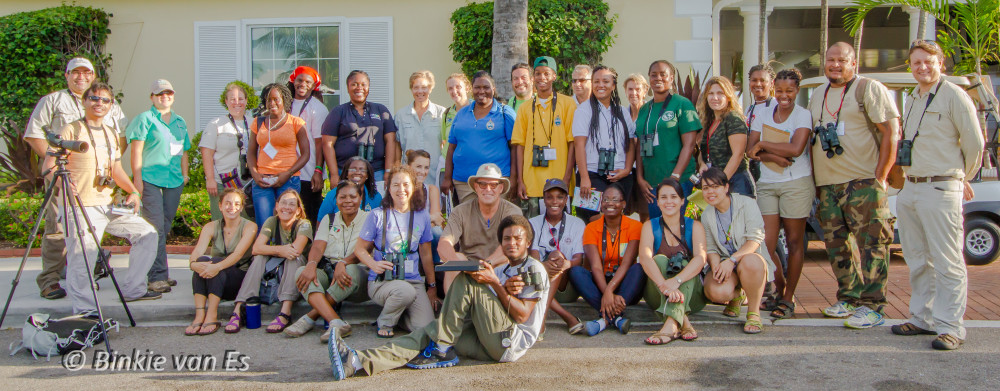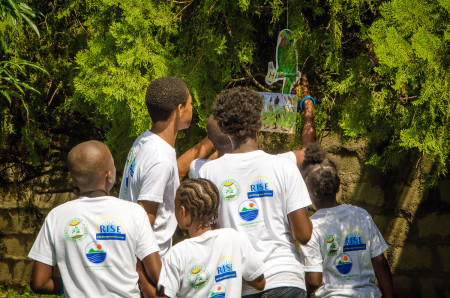
In the Caribbean and around the world, teachers and other educators are looking for new ways to engage students with the natural environment, inspire an interest in science and math and help youth learn to work together as a team. Some environmental educators believe birds may be the perfect focal point for accomplishing these goals, and the BirdSleuth Caribbean program was developed. During an intensive three-day training session in the Bahamas, Caribbean educators learned the program and are now poised to spread the program throughout the region.
The Retreat is a small national park nestled amongst the hustle and bustle of Nassau, Bahamas. Inside The Retreat, two dozen educators and conservationists from different islands throughout the Caribbean gathered October 15 to 17, 2014 to learn the BirdSleuth Caribbean curriculum. After their training, they returned to their islands ready to share this program with teachers and students.
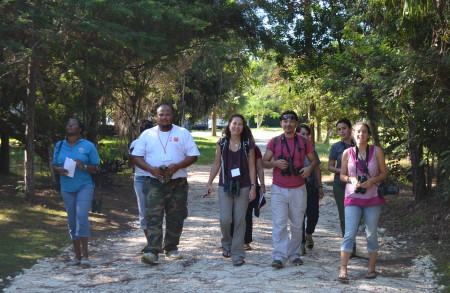
BirdSleuth Caribbean is a program designed to teach youth how to study, appreciate and conserve Caribbean birds. It is part of a larger BirdSleuth program developed by the Cornell Lab of Ornithology. The original, US-based BirdSleuth program was adapted specifically for the Caribbean and its birds. At this workshop, each attendee was trained in the program and return with a full kit of supplies to implement the program. Over the coming months and years, workshops will be held throughout the Caribbean to train local teachers this program so they can share these activities with their classes.
The BirdSleuth curriculum includes many fun, hands-on activities, like creating a bird journal, learning to use binoculars and doing bird counts that can be entered into the citizen science website eBird Caribbean and used in actual scientific research. One benefit of the program is the opportunity to get kids out into nature where they can be active and forge a connection with the animals around them. The citizen science component, learning to identify birds and enter them into eBird, also teaches kids that their observations can help scientists learn more about topics like bird migration.
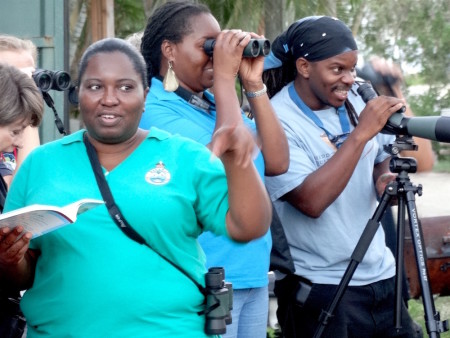
Of course, many teachers and students may feel they don’t have enough experience with birds to teach this curriculum. One key component of the program is training the teachers and students to observe and identify birds. They learn to do this by observing physical characteristics, but also by looking at behavior, habitat and what birds are found in the area. The program also shows that we often know more about birds that we think. Almost everyone can already distinguish a duck from a seagull or an egret.
“The BirdSleuth training workshop was hands down the best training experience I’ve had to date,” commented Falon Cartwright, Preserve Manager for the Bahamas National Trust Leon Levy Native Plant Preserve in Eleuthera, Bahamas. “The curriculum is well designed, thorough, and super engaging and the level of organization and expertise demonstrated by our facilitators made the three days an absolute pleasure. I am so excited to use the BirdSleuth curriculum to encourage young people in Eleuthera to learn about and value our local birds.”
Israel Guzman (Sociedad Ornitológica Puertorriqueña Inc., Puerto Rico) had this to say: “Birds Caribbean, the Cornell Lab of Ornithology and the Bahamas National Trust teamed up to bring us one of the best workshops ever. Learning by doing and sharing experiences made us all get the most from this workshop based on the BirdSleuth Curriculum. The whole experience will be replicated to provide students with the right tools to reconnect them to nature, and lead them to love and care about birds and conservation.”
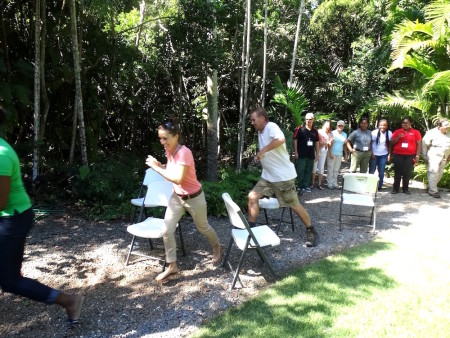
Birds are a powerful tool to help kids and people of all ages connect with nature and develop a conservation mentality. Birds are fantastic ambassadors for nature because they are found everywhere, easy to see and identify and endlessly fascinating. Studying birds is a great tool for encouraging interest in both science and in the outdoors. Collaborative activities like many of the ones in the BirdSleuth program also help kids learn teamwork and cooperation skills.
We thank the Neotropical Migratory Bird Conservation Act Fund of the US Fish and Wildlife Service, International Programs of the US Forest Service, the Royal Society for the Protection of Birds, Optics for the Tropics, Franklin Dodd Communications, Tropical Shipping, and Vortex Optics for funding and support of the BirdSleuth Caribbean Project. The Wildlife Without Borders program of the US Fish and Wildlife Service provided funding for the pilot project to develop the BIrdSleuth Caribbean curriculum. We also thank the Bahamas National Trust for hosting our International Training Workshop and our many partners and educators for participating in the project and doing an amazing job training teachers and educating youth in their home countries.
